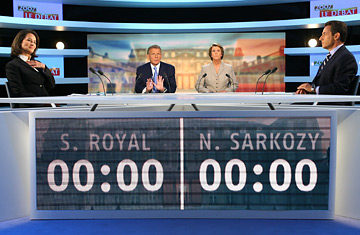
French Socialist Party candidate Segolene Royal, left, faces conservative front-runner Nicolas Sarkozy, right, minutes before their only televised debate.
Royal, for her part, did precisely that. Her dander ran highest after Sarkozy argued that handicapped children in France should be integrated into normal schools. Royal said it was "scandalous" and "the height of political immorality" for Sarkozy to make such a proposition "with a tear in your eye" when the conservative government he has served in for the last five years, she claimed, suppressed the teaching positions that would have made such a policy possible. Sarkozy tried to turn the exchange to his advantage by intoning that the responsibilities of the presidency are "very heavy" and that using words like immorality is "not the way to respect one's adversary." Royal countered that she had a "different vision of political morality," one in which "words ought to be in line with actions."
Exchanges like that one kept the debate — the only one before Sunday's runoff election — bubbling on for more than a half hour beyond its schedule; the two journalists at the square table as moderators were reduced to essentially throwing out bait for the pair to chew on. Royal, dressed soberly in a white collared shirt and black blazer, kept her eyes riveted on Sarkozy (blue suit and striped tie) as she unrolled ideas as she saw fit rather than in the ordered sequence the moderators vainly tried to preserve. Several times they had to intervene to give Sarkozy a chance to claim equal time.
The debate first became heated over the issue that tops voter concerns: France's sluggish economy and chronic unemployment. For Sarkozy, there's no mystery to the malaise: "It's because we work less than others do." Though he doesn't advocate a full reversal of the 35-hour working week introduced by a Socialist government in 1998, he wants to free both employers and employees from paying payroll tax and insurance charges on overtime hours. Royal's response: "I prefer to give work to those who don't have any," especially through a government-funded program to give six-month "springboard" jobs to young people leaving school.
The two differed on almost everything else: Sarko wants to encourage home ownership by deducting mortgage payments; Sego stresses the backlog in social housing. Sarko proposes a legal right to childcare; Sego says the idea of going to court to get a spot in a daycare center is absurd since courts are already overworked. Sarko resolutely opposes Turkish membership in the European Union; Sego says that France doesn't yet have to decide — and neither does she. Sarko wants to keep the basic institutions of France as they are; Sego wants to launch a 6th Republic with a stronger parliament.
So who won? Sego landed her blows, proving to anyone that harbored any doubts that she can hold her own against France's most formidable political persuader. In doing so, however, she often resorted to a hectoring tone, serial interruptions and even derision ("Are you wounded?" she asked in dripping faux pity after one exchange) that could turn off as many voters as it attracts. Sarkozy might have come on stronger if he weren't up against a woman — and if he didn't already have a menacing image for many French voters. Surely that figured in his courteous response to a moderator's question of how each candidate saw his or her rival. "I respect her talent..., I respect what she did to get to where she is, and I bear no personal animosity toward her," said a smiling Sarkozy. Ségolène Royal offered no such platitudes. "This is a debate of ideas," she demurred, saying that she has "a different vision of France's future" than her opponent. At one point in the debate she boasted that she had beaucoup de sang-froid. No one's likely to disagree. But it may not matter much after Sunday's vote.
